Jon Gambrell
Fri, June 14, 2024 at 4:57 a.m. MDT·7 min read
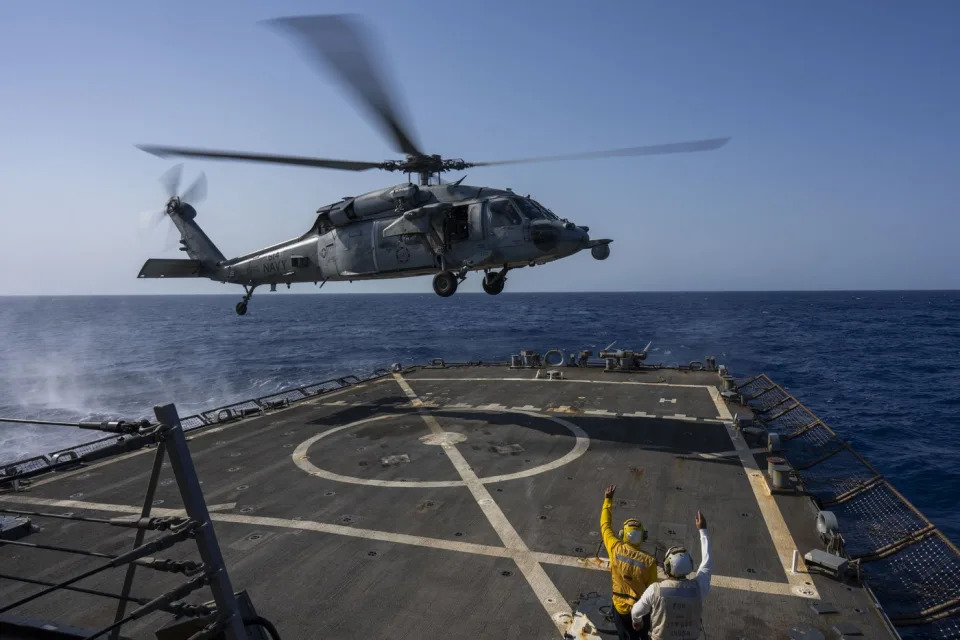

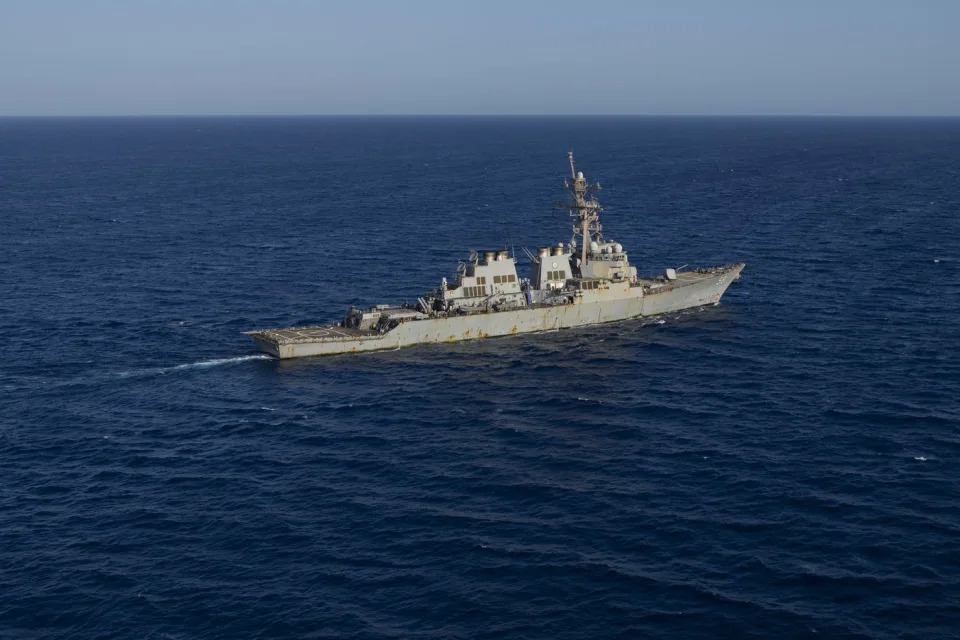
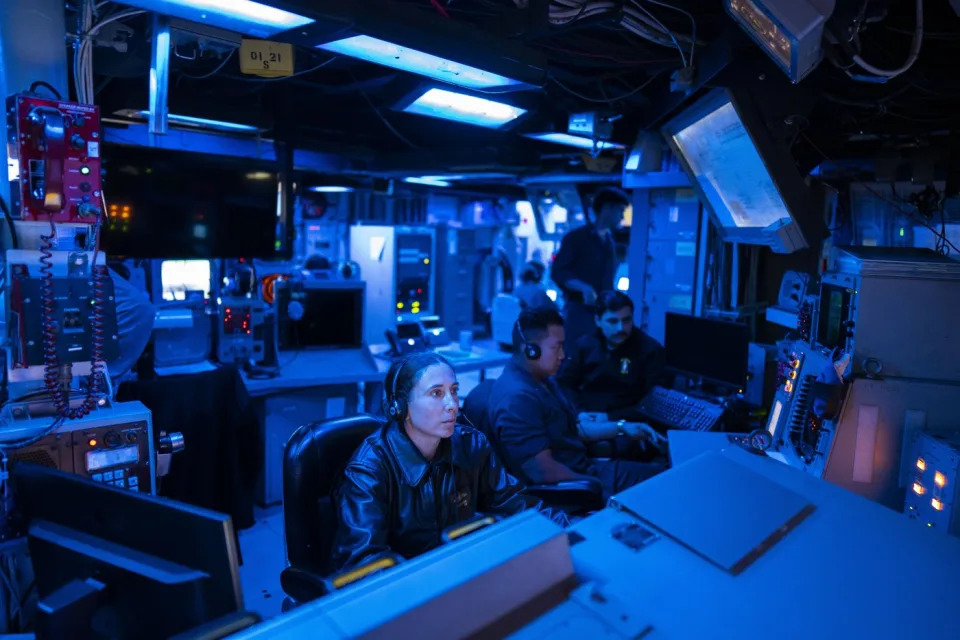
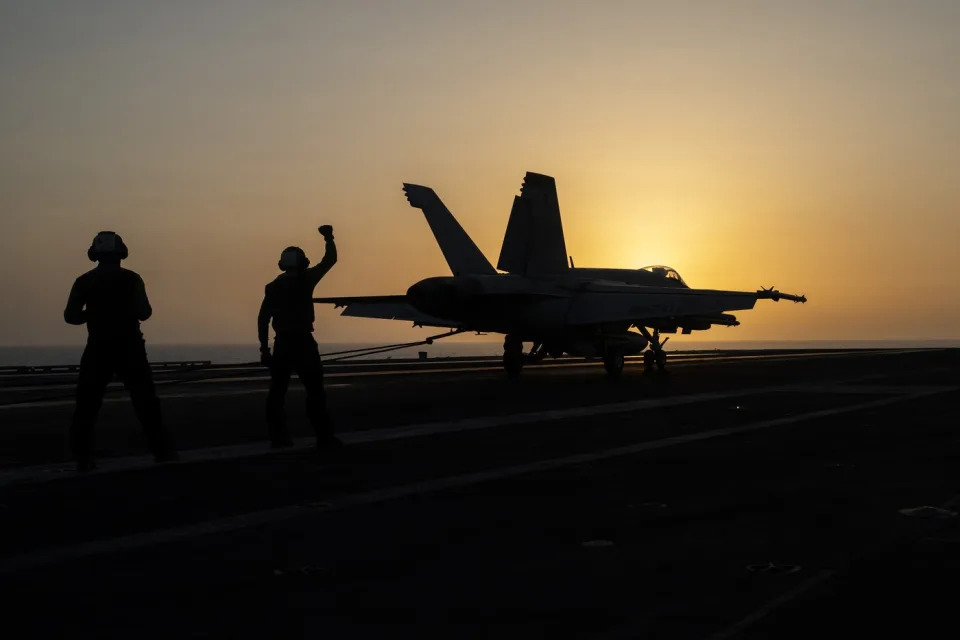
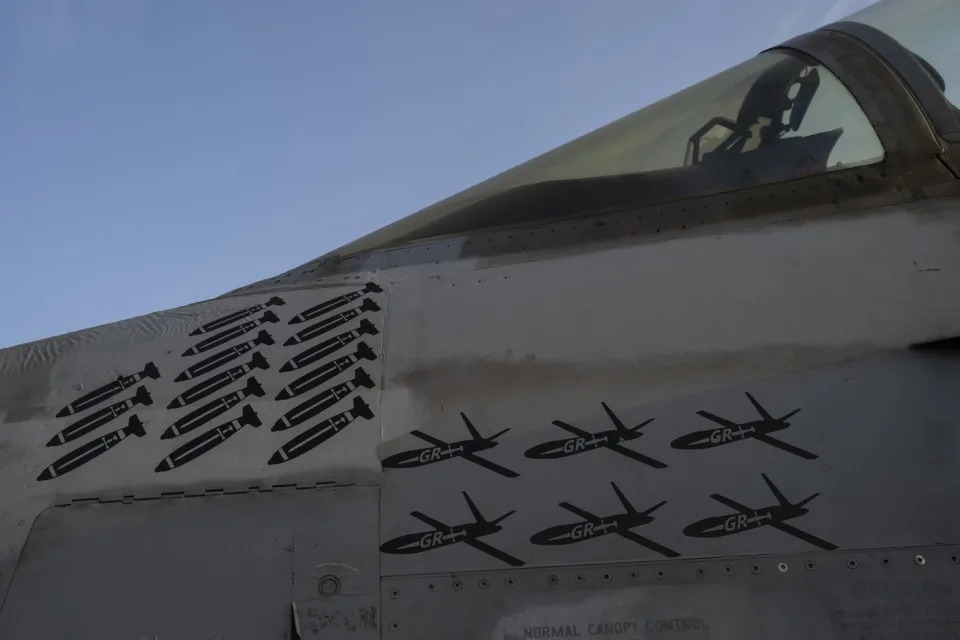

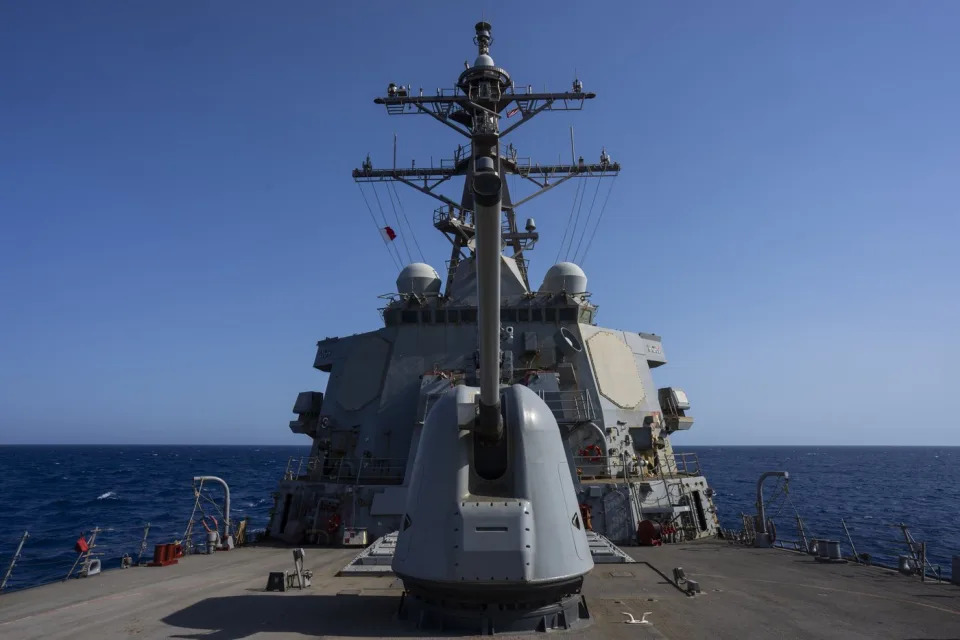
The Associated Press
ABOARD THE USS LABOON IN THE RED SEA (AP) — The U.S. Navy prepared for decades to potentially fight the Soviet Union, then later Russia and China, on the world's waterways. But instead of a global power, the Navy finds itself locked in combat with a shadowy, Iran-backed rebel group based in Yemen.
The U.S.-led campaign against the Houthi rebels, overshadowed by the Israel-Hamas war in the Gaza Strip, has turned into the most intense running sea battle the Navy has faced since World War II, its leaders and experts told The Associated Press.
The combat pits the Navy's mission to keep international waterways open against a group whose former arsenal of assault rifles and pickup trucks has grown into a seemingly inexhaustible supply of drones, missiles and other weaponry. Near-daily attacks by the Houthis since November have seen more than 50 vessels clearly targeted, while shipping volume has dropped in the vital Red Sea corridor that leads to the Suez Canal and into the Mediterranean.
The Houthis say the attacks are aimed at stopping the war in Gaza and supporting the Palestinians, though it comes as they try to strengthen their position in Yemen. All signs suggest the warfare will intensify — putting U.S. sailors, their allies and commercial vessels at more risk.
“I don't think people really understand just kind of how deadly serious it is what we're doing and how under threat the ships continue to be,” Cmdr. Eric Blomberg with the USS Laboon told the AP on a visit to his warship on the Red Sea.
“We only have to get it wrong once," he said. "The Houthis just have to get one through.”
Seconds to act
The pace of the fire can be seen on the Arleigh Burke-class destroyer, where the paint around the hatches of its missile pods has been burned away from repeated launches. Its sailors sometimes have seconds to confirm a launch by the Houthis, confer with other ships and open fire on an incoming missile barrage that can move near or beyond the speed of sound.
“It is every single day, every single watch, and some of our ships have been out here for seven-plus months doing that," said Capt. David Wroe, the commodore overseeing the guided missile destroyers.
One round of fire on Jan. 9 saw the Laboon, other vessels and F/A-18s from the aircraft carrier USS Dwight D. Eisenhower shoot down 18 drones, two anti-ship cruise missiles and a ballistic missile launched by the Houthis.
Nearly every day — aside from a slowdown during the holy Muslim fasting month of Ramadan — the Houthis launch missiles, drones or some other type of attack in the Red Sea, the Gulf of Aden and the narrow Bab el-Mandeb Strait that connects the waterways and separates Africa from the Arabian Peninsula.
The Navy saw periods of combat during the “Tanker Wars” of the 1980s in the Persian Gulf, but that largely involved ships hitting mines. The Houthi assaults involve direct attacks on commercial vessels and warships.
“This is the most sustained combat that the U.S. Navy has seen since World War II — easily, no question,” said Bryan Clark, a former Navy submariner and a senior fellow at the Hudson Institute. “We’re sort of on the verge of the Houthis being able to mount the kinds of attacks that the U.S. can’t stop every time, and then we will start to see substantial damage. … If you let it fester, the Houthis are going to get to be a much more capable, competent, experienced force.”
Dangers at sea and in the air
While the Eisenhower appears to largely stay at a distance, destroyers like the Laboon spend six out of seven days near or off Yemen — the “weapons engagement zone,” in Navy speak.
Sea combat in the Mideast remains risky, something the Navy knows well. In 1987, an Iraqi fighter jet fired missiles that struck the USS Stark, a frigate on patrol in the Persian Gulf during the Iran-Iraq war, killing 37 sailors and nearly sinking the vessel.
There's also the USS Cole, targeted in 2000 by boat-borne al-Qaida suicide bombers during a refueling stop in Yemen's port city of Aden, which killed 17 on board. AP journalists saw the Cole patrolling the Red Sea with the Laboon on Wednesday, the same day the Houthis launched a drone-boat attack against a commercial ship there that disabled the vessel.
Rear Adm. Marc Miguez, the Navy’s commander for its Carrier Strike Group Two, which includes the Eisenhower and supporting ships, said the Navy had taken out one underwater bomb-carrying drone launched by the Houthis as well during the campaign.
“We currently have pretty high confidence that not only is Iran providing financial support, but they’re providing intelligence support,” Miguez said. “We know for a fact the Houthis have also gotten training to target maritime shipping and target U.S. warships.”
Asked if the Navy believed Iran picks targets for the Houthis, Miguez would only say there was “collaboration” between Tehran and the rebels. He also noted Iran continues to arm the Houthis, despite U.N. sanctions blocking weapons transfers to them.
Iran's mission to the United Nations told the AP that Tehran "is adept at thwarting the U.S. strategy in a way that not only strengthens (the Houthis) but also ensures compliance with the pertinent resolutions.”
The risk isn't just on the water. The U.S.-led campaign has carried out numerous airstrikes targeting Houthi positions inside Yemen, including what the U.S. military describes as radar stations, launch sites, arsenals and other locations. One round of U.S. and British strikes on May 30 killed at least 16 people, the deadliest attack acknowledged by the rebels.
The Eisenhower's air crews have dropped over 350 bombs and fired 50 missiles at targets in the campaign, said Capt. Marvin Scott, who oversees all the air group's aircraft. Meanwhile, the Houthis apparently have shot down multiple MQ-9 Reaper drones with surface-to-air missile systems.
“The Houthis also have surface-to-air capabilities that we have significantly degraded, but they are still present and still there,” Scott said. “We're always prepared to be shot at by the Houthis.”
A stalemated war
Officers acknowledge some grumbling among their crew, wondering why the Navy doesn't strike harder against the Houthis. The White House hasn't discussed the Houthi campaign at the same level as negotiations over the Israel-Hamas war.
There are several likely reasons. The U.S. has been indirectly trying to lower tensions with Iran, particularly after Tehran launched a massive drone-and-missile attack on Israel and now enriches uranium closer than ever to weapons-grade levels.
Meanwhile, there's the Houthis themselves. The rebel group has battled a Saudi-led coalition into a stalemate in a wider war that's killed more than 150,000 people, including civilians, and created one of the world’s worst humanitarian disasters.
The U.S. directly fighting the Houthis is something the leaders of the Zaydi Shiite group likely want. Their motto long has been “God is the greatest; death to America; death to Israel; curse the Jews; victory to Islam.” Combating the U.S. and siding publicly with the Palestinians has some in the Mideast praising the rebels.
While the U.S. and European partners patrol the waterways, Saudi Arabia largely has remained quiet, seeking a peace deal with the Houthis. Reports suggest some Mideast nations have asked the U.S. not to launch attacks on the Houthis from their soil, making the Eisenhower's presence even more critical. The carrier has had its deployment extended, while its crew has had only one port call since its deployment a week after the Oct. 7 Hamas attack on Israel.
Meanwhile, the Houthi attacks continue to depress shipping through the region. Revenue for Egypt from the Suez Canal — a key source of hard currency for its struggling economy — has halved since the attacks began. AP journalists saw a single commercial ship moving through the once-busy waterway.
“It's almost a ghost town,” Blomberg acknowledged.
___
Follow AP's coverage at https://apnews.com/hub/israel-hamas-war
Jon Gambrell, The Associated Press
Houthi missile strikes set ship ablaze, injure one crew, US military says
Nayera Abdallah, Enas Alashray and Yomna Ehab
Updated Thu, June 13, 2024 at 6:51 p.m. MDT·2 min read
DUBAI/CAIRO (Reuters) -Missiles fired by Yemen's Houthi militants struck the Palau-flagged Verbena cargo ship in the Gulf of Aden on Thursday, sparking a fire and severely injuring one of her crew, U.S. Central Command said.
The Iran-allied Mouths have launched dozens of attacks on international shipping in the Red Sea region since November in solidarity with the Palestinians in the war between Israel and Hamas.
Thursday's attack marked their second direct hit on a merchant ship in two days, and the group said its campaign would continue until hostilities in the Gaza Strip end.
Three missiles struck the Verbena on Thursday, sparking a fire and damaging the ship, the United Kingdom Maritime Trade Operations (UKMTO) agency said.
While her crew fought the fire, an aircraft from the U.S. Navy's Philippine Sea warship medically evacuated the injured mariner to a partner force ship nearby for medical attention, U.S. Central Command said.
Reuters was not able immediately to contact the Verbena's Polish manager. The vessel, loaded with wood construction material, was sailing to Italy at the time of the attack, CENTCOM said. Security and military sources said the Verbena still has power and steering capabilities.
A day earlier, Yemen's Houthi militants took responsibility for small watercraft and missile attacks that left the Tutor, a Greek-owned cargo ship, taking in water and in need of rescue near Yemen's Red Sea port of Hodeidah.
The Philippines' Department of Foreign Affairs condemned the assault on the Tutor, which had Filipino crew on board.
Some media outlets have reported that one person died as a result of the attack on the Tutor. Greek shipping authorities said they had no confirmation of that. Manager Evalend Shipping has not responded to Reuters requests for comment.
The Houthi campaign in the Red Sea region has disrupted global shipping, cascading delays and costs through supply chains. The militants have sunk one ship, seized another vessel and killed three seafarers in separate attacks.
"Operations will not stop unless the aggression stops and the siege on the Palestinian people in the Gaza Strip is lifted," the Houthis said on Thursday.
They claimed to also have directly hit two other ships. UKMTO said the master of one of those reported an explosion near the vessel that did not cause any damage or injury. Reuters was not able to immediately verify the other account.
While several near misses have been reported, "the data would also say (the Houthis) are getting more successful with direct hits," Joshua Hutchinson, managing director of intelligence and risk for British maritime security firm Ambrey, said in a post on LinkedIn.
(Reporting by Nayera Abdallah in Dubai, Enas Alashray and Yomna Ehab in Cairo, Neil Jerome Morales in Manila, Renee Maltezou in Athens, Jonathan Saul in London and Lisa Baertlein in Los Angeles; Editing by Toby Chopra, Bernadette Baum and Sandra Maler)
Houthi sea drone badly damages ship in Red Sea; U.S. destroys missile launchers
Paul Godfrey
Thu, June 13, 2024
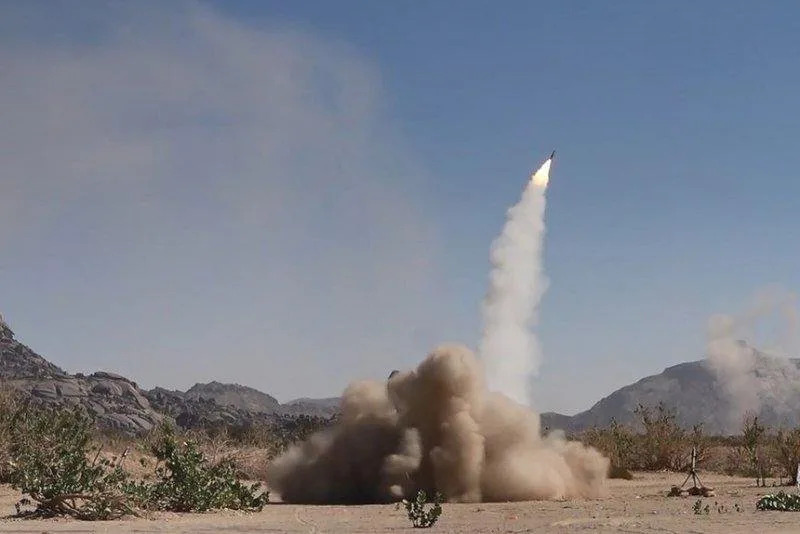
U.S. military forces launched attacks on Houthi-controlled areas of Yemen destroying three anti-ship cruise missile launchers and a drone over the Red Sea after the rebel group fired anti-ship missiles and a Greek-owned bulk carrier was badly damaged by a sea drone. File photo by EPA-EFE/Houthi Media Center
June 13 (UPI) -- A Greek-owned bulk carrier flooded after being badly damaged in a ramming by an unmanned surface vessel launched by the Houthis rebels in Yemen, British and American authorities said.
The master of the 44,000-ton M/V Tutor reported the vessel was "taking on water and not under the control of the crew" after being hit in the stern by a "16-23 foot-long craft" in Wednesday's attack in the Red Sea, about 66 miles southwest of the port of Hudaydah, the United Kingdom Maritime Trade Operations center said in a bulletin.
"Military authorities are assisting. Vessels are advised to transit with caution and report any suspicious activity," said the Royal Navy-run maritime coordination center.
The incident came as U.S. military forces in the region launched attacks on Houthi-controlled areas of Yemen destroying three anti-ship cruise missile launchers, U.S. Central Command said in a post on X.
One uncrewed aerial system launched from a Houthi-controlled area of Yemen over the Red Sea was also destroyed.
CENTCOM strongly condemned the attack on the Tutor along with the firing into the Red Sea of two anti-ship ballistic missiles by Houthis in Yemen that failed to hit their targets.
"The impact of the USV caused severe flooding and damage to the engine room," CENTCOm said.
"This continued malign and reckless behavior by the Iranian-backed Houthis threatens regional stability and endangers the lives of mariners across the Red Sea and Gulf of Aden,"
In a statement claiming responsibility, a Houthi military spokesman claimed the attack had left the Tutor "seriously damaged, vulnerable to sinking".
He added that it had been targeted with the sea drone because the owners had breached the group's "ban on entry to the ports of occupied Palestine."
The Houthis have been menacing commercial shipping transiting the key Red Sea route linking the West with the Middle East, the sub-Continent and Asia, launching drones and missiles at vessels in what it claims is support for the cause of the Palestinians in the conflict in Gaza.
Two weeks ago, U.S. and British forces carried out their first joint "defensive" strikes since February, with warplanes hitting Houthi targets in Yemen and the Red Sea, destroying eight drones
CENTCOM said the attacks were mounted because the unmanned aerial vehicles and the other targets in Houthi-controlled areas and above the Red Sea "presented a threat to U.S. and coalition forces in the region."
Ship severely flooded after Houthi attack in Red Sea
George Wright - BBC News
Wed, June 12, 2024

The Houthis have declared support for Palestinians in the Gaza Strip [Getty Images]
The US military says a Greek-owned ship in the Red Sea has been hit by an unmanned surface vessel launched by the Houthis in Yemen, causing severe flooding and damage to the engine room.
The Royal Navy’s UK’s Maritime Trade Operations (UKMTO) office said it received reports of a ship being struck on the stern about 66 nautical miles southwest of the rebel-held port of Hodeida in Yemen on Wednesday.
The vessel was taking on water, and not under the command of the crew, UKMTO stated. No casualties were reported.
The Iranian-backed Houthis claimed responsibility for the attack, saying it had targeted a Liberian-flagged vessel named Tutor using a sea drone.
The Houthis have been attacking shipping in the Red Sea in support of the Palestinians in Gaza, causing significant disruption to world trade.
In a statement, a Houthi military spokesman said the ship was attacked "using an unmanned surface boat, number of drones, and ballistic missiles", adding that the ship was "seriously damaged, vulnerable to sinking".
The ship was targeted "because the company that owns the ship has violated the decision to ban entry into the ports of occupied Palestine", the statement said.
US Central Command (CentCom) reported that "one Iranian-backed Houthi unmanned surface vessel (USV)" struck the Tutor, which it said was most recently docked in Russia.
The impact "caused severe flooding and damage to the engine room", it posted on X.
CentCom added that its forces had "successfully destroyed" three anti-ship cruise missile launchers in a Houthi-controlled area of Yemen in the past 24 hours, as well as one drone launched from a Houthi-controlled area of Yemen over the Red Sea.
"This continued malign and reckless behavior by the Iranian-backed Houthis threatens regional stability and endangers the lives of mariners across the Red Sea and Gulf of Aden," it said.
The armed Houthi group sees itself as part of an Iranian-led "axis of resistance" against Israel, the US and the wider West, and has declared its support for Palestinians in the Gaza Strip.
Since November, the rebel group has been carrying out attacks on ships they say are linked to Israel in the Red Sea and the Gulf of Aden, saying their actions are in support of the Palestinians.
The US and the UK have carried out a series of attacks on Houthi targets inside Yemen in response, leading the Houthis to retaliate against ships it believes are linked to those countries.
The rebels' attacks on merchant vessels in the Red Sea prompted many shipping companies to stop using the waterway, through which about 12% of global seaborne trade passes.
Separately, the UN has said Houthis in Yemen have detained two more of its employees, bringing the total number of personnel seized by the group in the past week to 13.
The World Health Organization (WHO) said one of its staff members was among those detained. WHO Director-General Dr Tedros Adhanom Ghebreyesus said on X he was “deeply worried” about the situation.
Who are the Houthis attacking Red Sea ships?
The US Navy's relentless battle against Houthi attacks
No comments:
Post a Comment